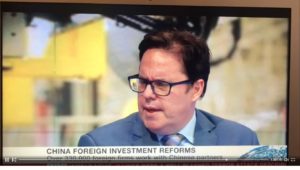
The story that Western companies are fleeing China is as old as the presence of foreign companies in China. China lawyer Mark Schaub looks at the recent flare in Western media and explains why they are wrong, again, in his weekly China Chit-chat.
Mark Schaub:
There has been a lot of discussion about China’s role in global supply chains. Many (often by lawyers or consultants dealing in China who feel dejected) have been predicting that Western companies will be departing China and cutting China out of their global supply chains. Their reasoning includes 1) geo-politics makes investing in China or trading with China less palatable; 2) COVID has awoken Western governments to the dangers of over-reliance upon one supplier (especially if that one supplier is China); and 3) Western consumer backlash due to human rights concerns.
My answer is “Don’t think so”.
For at least 15 years there have been regular reports from some elements of the media in respect of an expected wave of “onshoring” and of moving supply chains closer to their home markets. Back in 2007 a journalist Sara Bongiorni wrote a whole book on trying to live for a year in the US without buying any products made in China. Hers was less a political quest and more just to see if this was possible. It does, however, serve to show that the “China is making everything” concern is not new.
Despite all of this I have seen little evidence in my own practice of Western companies ceasing to source from China. A notable exception is certain clothing that seems to have moved largely to Bangladesh. However, this seems not to have been due to human rights concerns or the strategic importance of Western consumers being able to buy a cheap T-shirt … or rather it is no doubt due in no small part to the strategic importance of Western consumers being able to buy quality products on the cheap. Most of us have an in-built prejudice that exports are unallayed goods whereas imports are a sign of weakness. Rarely do we consider how the importing public has benefitted from trade with China – in the world of 2022 are most consumers worried about East-West geo-political issues or inflation.
We always think this time will be different – COVID lockdowns and a single ship blocking the Suez canal all illustrated how incredibly complex global supply chains could come a cropper in a manner beyond anyone’s control. However, perhaps the better lesson is how quickly logistics can overcome temporary disruptions and how clever they are to work around problems. Even at the height of the Shanghai lockdown workers beavered away in closed loop environments to keep the port open and avoid massive supply chain disruption.
Much more in Mark Schaub’s weekly China Chit-chat.
Mark Schaub is a speaker at the China Speakers Bureau. Do you need him at your (online) meeting or conference? Do get in touch or fill in our speakers’ request form.
Are you looking for more experts in managing your China risk? Do check out this list.
No comments:
Post a Comment